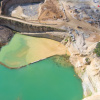The lack of engagement with local communities is at the root of many conflicts arising in the extractives industry.
When foreign investors come to a host country in order to establish their company in this sector, they usually negotiate directly with governments and only rarely with local communities, according to Luis Ore, a Peruvian mediator, negotiation trainer and expert in cross-cultural stakeholder engagement, who singled out mining as particularly problematic.
Mining, he told Devex, “is like a chair with three legs, where the other three are not engaging properly with the leg that is a problem.”
“Companies get permits and licenses from governments. They may have some contact with the communities but it’s very superficial, the information they share with them is not understandable, as they don’t share it in the language of the communities,” Ore said. “In fact [companies] go to the communities already with the permit [so] communities are out of the loop; they don’t know what’s going on.”
With the extractives industry, in many cases local communities "aren’t sufficiently involved" in the development and planning of this type of project,” noted Ian Gary, senior policy manager at Oxfam America, which has been pushing for companies, governments and donors to follow Free Prior and Informed Consent rules to make sure that communities have the right to say yes or no to these types of contracts.
Nevertheless, he told Devex that there was recognition of the importance of engaging communities is increasing, as well as using consensus as "a tool for the long-term success and viability of those projects.”
For the complete article, please see devex.








